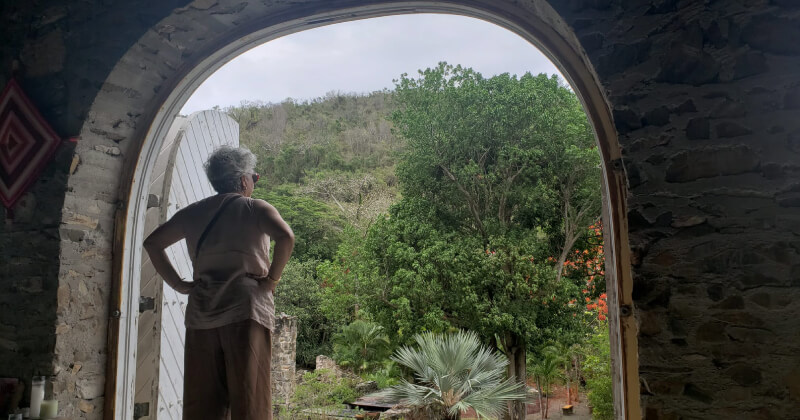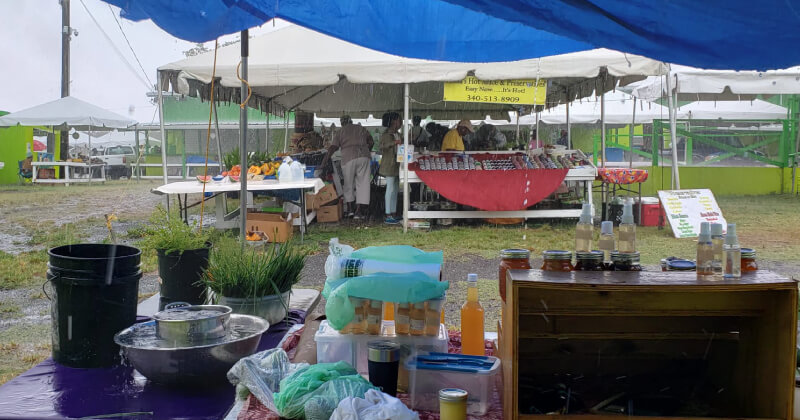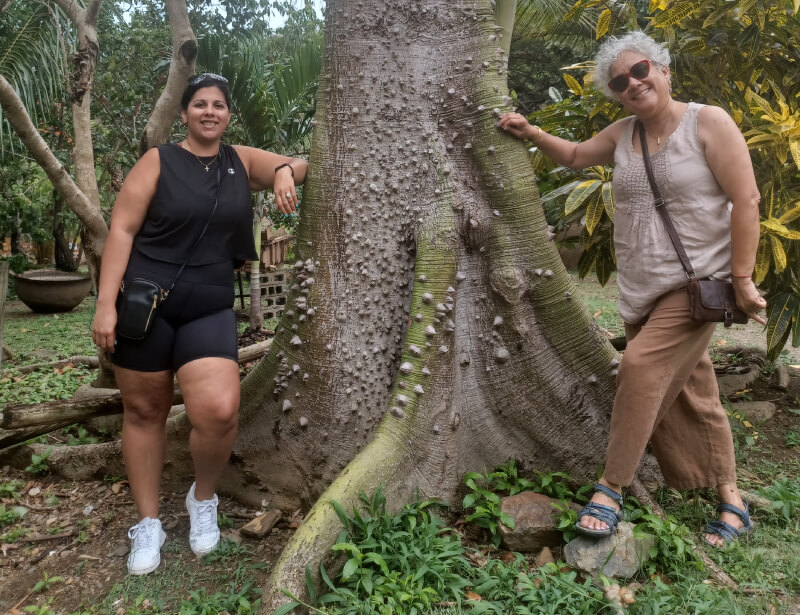Climate Action to Meet the Crisis: MCN Update from the US Virgin Islands
Sometimes the rain is a blessing, and sometimes it’s a curse. Last week, I arrived with Migrant Clinicians Network’s Deliana Garcia at a farmer’s market in St. Croix, the largest island of the US Virgin Islands. We were here to interview local farmers to better understand how climate change is affecting their livelihoods. Farmers were selling their fresh vegetables and fruit, which were appealingly arranged on fold-up tables and beneath pop-up tents and wood booths on the field and parking lot of a property of the Department of Agriculture.
It didn’t take long to find a pattern in their stories: the dry spell that has been felt across the Caribbean has strangled those who grow our food.
“It hasn’t rained enough, and when it does, it rains in the wrong place,” said one farmer. Other farmers spoke of ecological disaster and its corresponding economic disaster. One honey farmer told us, simply, that during the season there were times his beehives did not have any bees in them. He struggles to provide the honey he relied on to sell at the market. Most of the farmers have similar stories of poor crops and little to bring to the market – and most felt it directly related to rainfall.

MCN's Deliana Garcia observes the changing weather in St. Croix.
The spring and summer thus far had been remarkably dry, with far less rain than a typical year would bring. Forecasters have already voiced a concern of a repeat of the drought of 2014-2015, which resulted in water rationing across islands and in billions of dollars of lost revenues when crops failed. Already, farmers here were unable to bring to the market their typical load of vegetables and fruit, as their crops were not producing with the lack of water. They told us that few if any agencies, government or otherwise, had provided assistance or relief. As farmers explained to us the dry conditions they have endured, however, rain clouds gathered overhead. As a light rain began to noisily peck at the popup tents, one man began praying loudly in a language I didn’t recognize. He said he’s singing a prayer for rain, to end this dry spell that has been harming farmers.
Within two minutes, the rain became a shocking deluge. Waterfalls instantly appeared, rolling off of some tents; other tents blew away in the wind. The instant storm was unexpected – and the market was unprepared. I asked a farmer why she didn’t modify her booth to have drainage or to have at least something to redirect the water coming through to make sure it wouldn’t get flooded, but she said the market is strict about layout and would not permit a change.

A heavy rain interrupted a farmer's market in St. Croix.
That day, across the islands, many communities were flooded. Seven or eight inches fell in a matter of minutes. Many people lost power for hours. The farmers at the market packed up – there was no one to buy their vegetables in the rain, and many of their slots were flooded.
The juxtaposition was all too evident of the shifts in climate. As we spoke to farmers about the lack of rain, then suddenly too much came at once. Neither events – the dry spell nor the deluge – were typical weather for this region, but both fit cleanly into climate crisis forecasts. Only, they are no longer forecasts. They are day-to-day reality, the results of a rapidly changing climate that is already gravely affecting farmers across the world. Here in the Caribbean, we are at the peak of the hurricane season that for the seventh consecutive year is projected to develop a number of hurricanes above the historical average. At the same time, many of the islands are in severe drought or abnormally dry.
These changes and climate-related events are occurring with a backdrop of endless recovery processes after the devastating disasters caused by Hurricanes Irma and María. These disasters are amplified by the fragility of the structures, the political and economic conditions of the territories, and deficiencies in emergency management. This has resulted in challenges for the population, including reliable electrical power and safe water, access to recovery funds, safe housing, jobs, and food security.

MCN's Marysel Pagán Santana and Deliana Garcia.
Climate change requires urgent action, at all levels, to reduce the threat to those who are already in precarious life situations. Here in the Caribbean, Migrant Clinicians Network is working with stakeholders and community leaders to address the needs of the population before, during, and after disasters. Through our disaster training program in collaboration with the Atlantic Center for Occupational Health and Safety Training, we are building capacity among workers and clinicians to prepare and respond to emergencies while protecting themselves and others from hazards. This program, funded by the National Institute for Environmental Health Sciences, also considers the implications of climate change in the region and how we need to address workers’ well-being in a changing environment. In addition, MCN is also working on supporting initiatives and communities in St. Croix to address the health needs, including immunization, of vulnerable populations on the Island. We hope to expand our reach and provide support through our various programs to mobilize and build capacity in communities to address and respond to climate change.
Yet, the task is much greater than MCN. Individuals, communities, municipalities, businesses, corporations, and the federal government each must quickly accelerate their efforts to reduce fossil fuel emissions to slow the pace of the climate crisis, and simultaneously identify those who are most vulnerable to the changes and support their livelihoods. Unfortunately, those who have been left behind, those who have been formerly marginalized, are on track to be further left behind and more marginalized with the climate pressures. Our work seeks to reduce health inequities and bolster vulnerable communities, so that we can weather these storms together, and push forward for healthier communities, islands, and planet.
Got some good news to share? Contact us on our social media pages above.
Return to the main blog page or sign up for blog updates here.
- Log in to post comments
